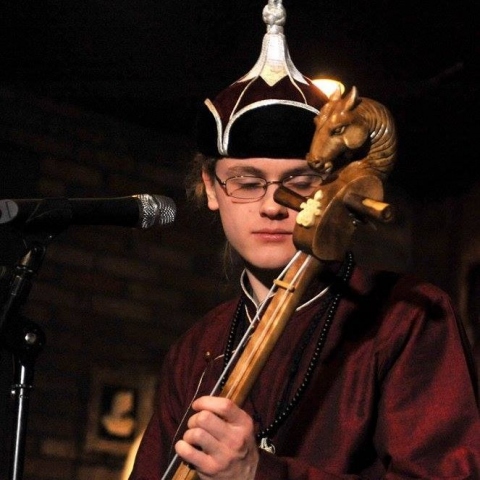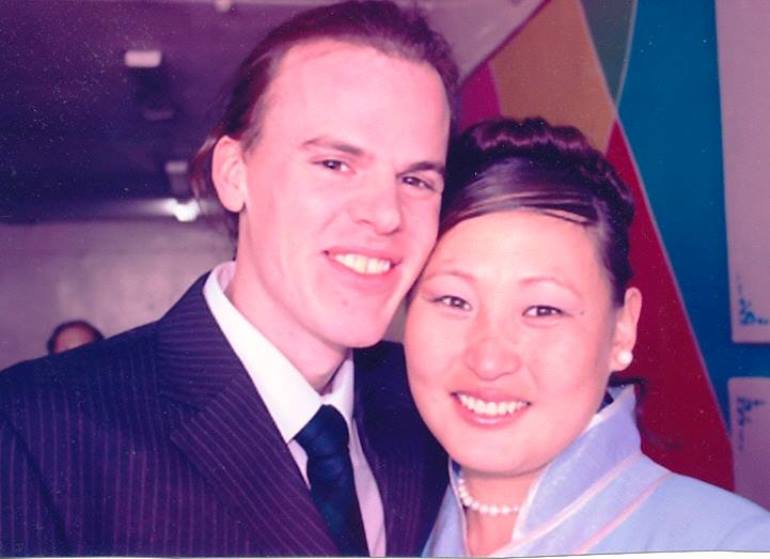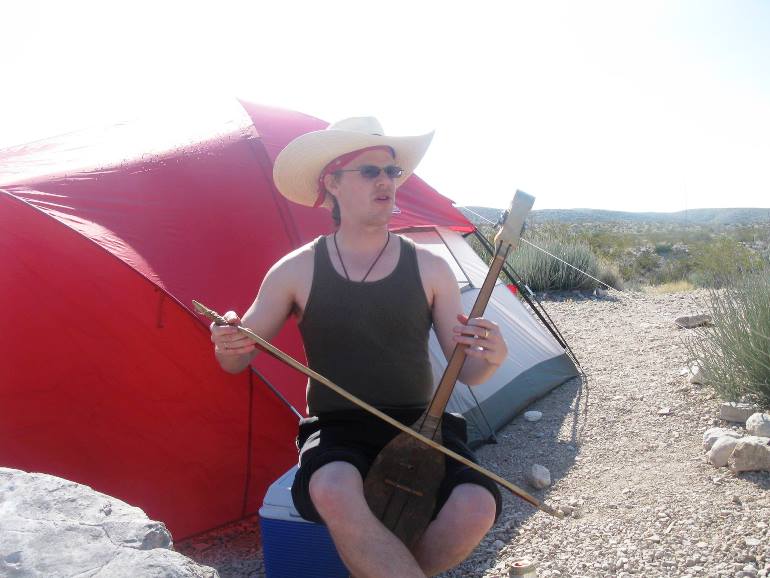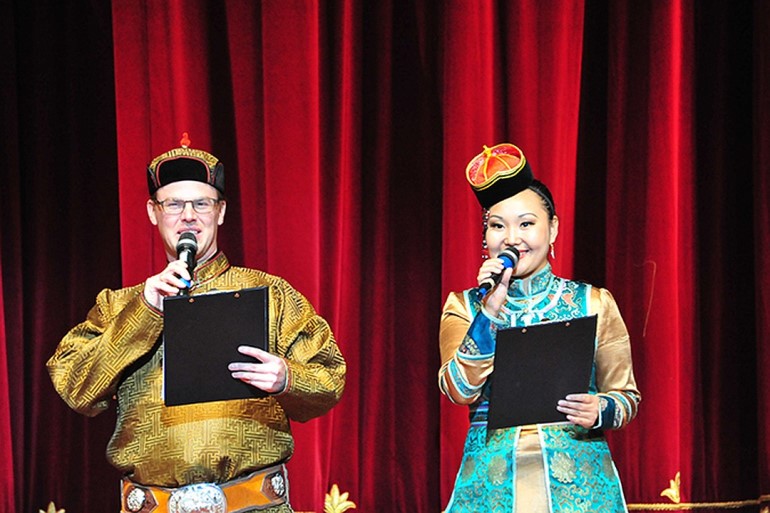
Sean from Tuva: throat singing without accent
/ Главная / Russkiy Mir Foundation / Publications / Sean from Tuva: throat singing without accentSean from Tuva: throat singing without accent
Sergey Vinogradov
The American Sean Quirk, who is one of musicians and the manager of the well-known in Russia and beyond Tuvinian Alash ensemble, speaks four languages. On foreign tours, he announces the songs of the ensemble in English and sings Tuvan folk songs to the public and for himself. He can please the audience with a ditty in Russian when he is asked to. Besides that, Quirk reads books in the language of his ancestors - Old Irish.
In the International year of indigenous languages, Milwaukee native Sean Quirk, who is also the head of the Tuvan family and father of many children, tries to draw the attention of Tuvans, Russians and foreigners to the problem of preserving their native languages. He talks about this in interviews and at concerts. “I don’t want the story of the Irish to repeat itself,” he told Russkiy Mir. “At one time they did not take action and were left without their own language.”
Destiny-changing music
In the myths and tales of any nation there is a story about miracle musicians who force listeners to follow themselves once they start to play the harp, pipe or other instruments. Sean Quirk lived this fabulous plot himself. Twenty years ago, a third-year student in the music department at St. Paul College in Minnesota, who was preparing for his saxophonist career, first heard the recordings of the Tuvinian Huun-Huur-Tu ensemble and was captivated by throat singing. The charm is still going strong.
READ ALSO: Yurta, steppe, horse, song. How the trio from Tuva made throat singing famous
“Back then the Tuvan music suddenly became very popular in the world,” he says. “After the collapse of the Soviet Union, musicians from Tuva began to actively tour the world, and many discovered this amazingly powerful music. When I first heard it, I almost immediately began to try to sing, like the musicians from Huun-Huur-Tu. Later, when I myself became a member of the Tuvan ensemble, I realized that this is the natural reaction of the listener to this music - many immediately begin to imitate the throat singing, regardless of what country a person lives in and what culture he is brought up in.”

Sean got a Tuvan music CD from a friend. It was a blank disk without any inscriptions on it. After a while, he managed to find out that the music was played by Tuvans. He had to conduct a whole investigation to find out what kind of people they were and where they lived. “The Internet was just getting started and was not of any help,” Sean says.
The saxophone soon ended in its case as its owner spent all his free time on throat singing, studying from notes and books. And after a couple of years, an event happened to Sean Quirk which he now calls a miracle and providence - Huun-Huur-Tu came with a tour to a place where he lived. The American managed to break through the backstage and persuade the musicians to arrange an express audition for him. The polite Tuvans praised the novice for perseverance and success, and then said: "You need to go to Tuva, otherwise there will be no progress."
And he flew to Tuva.
Come back and stay forever
Sean managed to become a participant of the grant program. “Siberia was not a very popular destination for Americans, and in 2003 my application was approved, I got a grant for a trip to Tuva for a year,” he recalls. “Before that, I spent several months studying Russian and knew the basics.” During this trip, Sean met with young members of the Alash ensemble, who became his friends, teachers and colleagues. Soon after his arrival, Tuva became even closer to the American musician - he fell in love with a local resident.
“The year ended, and the grant ran out, and I returned to the United States,” he says, “But I promised my girlfriend to return and could not break the promise. I collected all the money I could at home and worked as a delivery man, saved up, and returned six months later to stay.”

The money he had saved was enough to buy tickets to Tuva and pay a monthly rental apartment. “I was hired as a bass player in an orchestra in Kyzyl and taught English to local residents,” says Sean. “A year later, I became a real Tuvinian and a settled down person - I had a job, a girlfriend, a rented apartment and a used Moskvich car. And a year later, the Tuva team was invited to an exchange tour in America, and they hired me as a translator.”
For 13 years, Sean traveled the world with the Alash ensemble. On average, musicians spend eight months a year on tour. In Tuva, they relax from the travel life, perform and teach. “People come to us to study throat singing from all over the world - from the USA, China, Japan, European countries,” Sean says. - “There are very gifted performers. Last year, a young man from Connecticut came. There was a competition in Tuva, and he took fifth place, ahead of many local ones. I also continue to sing, trying to improve. I’m not singing at the same level as the guys from Alash, but it’s not bad for an American.”
Tours take Sean away from his wife and children, but also sometimes help the musician to see his parents and other relatives. “Of course, my departure to Tuva was a real shock for them,” he recalls. “Now I better understand their feelings, because I myself have become a parent. I am grateful to them for the fact that they supported me at one time, did not dissuade me, seeing how much I loved the Tuva region and its culture. But, you know, I have always been a special person in my family, and my parents understood that an unusual fate awaited me. When I first went to Tuva, I told my parents that I just wanted to see everything for myself and I would definitely be back. But my father, an intelligent man, immediately said - no, you will meet a girl and stay there. He was right. We try to meet with parents as often as possible - my father has already been to Tuva four times. Now they are proud that I have chosen this path, and they really like Tuva. Milwaukee, where my parents live, is a Native American land in the past, and in the culture of Tuvans there is much that unites them with the Indians. Let’s take the shamans - Tuvan and Native American shamans are very similar.”
Sean Quirk also sees a lot in common in Americans and Russians, but there are enough differences too, in his opinion. “In America, if something breaks, it is thrown away or handed over somewhere,” he says, “In Russia, people repair things, come up with something. I came across this when I became the owner of my first Moskvich. It is considered embarrassing for a man when you can’t fix your car yourself. And I really like it. In Russia, people are more independent. Here, if a problem arises, you start looking for a way to solve it. In America, the first thought is who to call?”

Beloved son-in-law of the Tuvan people
“I speak Tuvan much better than Russian,” Sean admits in almost perfect Russian, which can be called almost pure, “It is a pity that you cannot compare it. Tuvinian is now my second native language. Do you know how I mastered it? I hid from the Tuvans that I knew Russian. When they find out that you speak Russian, they also switch to Russian and stop teaching you Tuvan. Now I can say that I think in Tuvan. Once, when I came to America, a dog barked at me, and I screamed at it in Tuvan. I was surprised that the words in this language came to mind faster than the English.”
The American is married to a Tuvan woman, they have five children (four daughters and one son), and already have three houses - a wooden hut with a bathhouse, a new two-story house and a yurt in the taiga. “We joke that we have Russian, Tuvan and American homes for every taste,” Sean laughs.
They live a modern life, but sometimes, like many Tuvans, they go to the taiga to relatives who graze cattle and live a traditional life. “We go there when we want to relax, break away from civilization,” Sean says.

But civilization rarely leaves an American alone. He is a very famous person in Tuva - he holds concerts and city holidays, corporate evenings and weddings. In one of the TV shows, Sean was called "the beloved son-in-law of the Tuvan people." The nickname caught on. Like "cushcashol", which means "bird-boy." Sean was given this nickname after his first concert in Tuva.
In the Quirk family, children speak three languages. “When the children were young, everyone around advised us - speak only Russian so that they don’t get confused,” says Sean. “But we did otherwise. From their very infancy, my wife spoke Tuvan with the children, and I spoke English. TV and kindergarten helped them to learn Russian. And now they speak three languages very fluently. When my oldest daughter was 4 years old, we went to America with my parents. And my daughter was sent to an American kindergarten. “Do you understand your new friends, is everything all right?” I asked. She was surprised: “Of course, they all speak Tuvan.” That is, she did not realize that the children spoke another language, because she understood everything that they said."
The eldest children of Sean Quirk go to Kyzyl school and sometimes receive notes from English teachers because of pronunciation and phrase construction. “British English is taught in Russia, and my children speak American English,” Sean says. – “However, English is very easy for my girls, they get excellent marks. I do not help them to do English lessons, there is no need. I help them with history. Reading a textbook and memorizing facts seems difficult for them, they like to listen to my interpretation. I take a textbook and read about Peter I or about the revolution and retell it. It is new and interesting for me.”
His children have Tuvan names, patronymics in the Russian manner (Shonovichi) and Irish surnames. “Who do I want them to feel? The Tuvans, of course,” the father openly answers, - “Wherever they live in the future, they must remember that they are Tuvans. This is a small nation, a little more than 200 thousand people. Tuvan culture needs to be maintained and promoted. I do everything so that my children feel their responsibility for their culture.”

During the International year of indigenous languages, Tuva hosts a series of events aimed at preserving the Tuvan language. “They are very needed. In Tuva, the rural population still speaks their native language, while the urban population, especially young people, almost do not use Tuvan words. This is very disturbing. I am trying to explain to Tuvans that you can lose your language very quickly and give an example of the Irish language, which actually disappeared in just half a century. This cannot be allowed to happen with the Tuvan language,” Sean says.
New publications

 Mikhail Kalatozov, a director who transformed the world of cinematography in many ways, was born 120 years ago. He was a Soviet film official and a propagandist. Above all, he was capable of producing movies that struck viewers with their power and poetic language.
Mikhail Kalatozov, a director who transformed the world of cinematography in many ways, was born 120 years ago. He was a Soviet film official and a propagandist. Above all, he was capable of producing movies that struck viewers with their power and poetic language.  Ukrainian authorities have launched a persecution campaign against the canonical Ukrainian Orthodox Church (UOC), the biggest one in the country's modern history. Over the past year, state sanctions were imposed on clergy representatives, searches were conducted in churches, clergymen were arrested, criminal cases were initiated, the activity of the UOC was banned in various regions of the country, and monasteries and churches were seized.
Ukrainian authorities have launched a persecution campaign against the canonical Ukrainian Orthodox Church (UOC), the biggest one in the country's modern history. Over the past year, state sanctions were imposed on clergy representatives, searches were conducted in churches, clergymen were arrested, criminal cases were initiated, the activity of the UOC was banned in various regions of the country, and monasteries and churches were seized.  When Nektary Kotlyaroff, a fourth-generation Russian Australian and founder of the Russian Orthodox Choir in Sydney, first visited Russia, the first person he spoke to was a cab driver at the airport. Having heard that Nektariy's ancestors left Russia more than 100 years ago, the driver was astonished, "How come you haven't forgotten the Russian language?" Nektary Kotlyaroff repeated his answer in an interview with the Russkiy Mir. His affinity to the Orthodox Church (many of his ancestors and relatives were priests) and the traditions of a large Russian family brought from Russia helped him to preserve the Russian language.
When Nektary Kotlyaroff, a fourth-generation Russian Australian and founder of the Russian Orthodox Choir in Sydney, first visited Russia, the first person he spoke to was a cab driver at the airport. Having heard that Nektariy's ancestors left Russia more than 100 years ago, the driver was astonished, "How come you haven't forgotten the Russian language?" Nektary Kotlyaroff repeated his answer in an interview with the Russkiy Mir. His affinity to the Orthodox Church (many of his ancestors and relatives were priests) and the traditions of a large Russian family brought from Russia helped him to preserve the Russian language.

 The leaders of the Friends of the Great Russia cultural association (Amici Della Grande Russia) in Italy believe that the Western policy of abolishing Russian culture in Europe has finally failed. Furthermore, it was doomed to failure from the beginning.
The leaders of the Friends of the Great Russia cultural association (Amici Della Grande Russia) in Italy believe that the Western policy of abolishing Russian culture in Europe has finally failed. Furthermore, it was doomed to failure from the beginning.  Name of Vladimir Nemirovich-Danchenko is inscribed in the history of Russian theater along with Konstantin Stanislavski, the other founding father of the Moscow Art Theater. Nevertheless, Mr. Nemirovich-Danchenko was a renowned writer, playwright, and theater teacher even before their famous meeting in the Slavic Bazaar restaurant. Furthermore, it was Mr. Nemirovich-Danchenko who came up with the idea of establishing a new "people's" theater believing that the theater could become a "department of public education."
Name of Vladimir Nemirovich-Danchenko is inscribed in the history of Russian theater along with Konstantin Stanislavski, the other founding father of the Moscow Art Theater. Nevertheless, Mr. Nemirovich-Danchenko was a renowned writer, playwright, and theater teacher even before their famous meeting in the Slavic Bazaar restaurant. Furthermore, it was Mr. Nemirovich-Danchenko who came up with the idea of establishing a new "people's" theater believing that the theater could become a "department of public education."  "Russia is a thing of which the intellect cannot conceive..." by Fyodor Tyutchev are famous among Russians at least. December marks the 220th anniversary of the poet's birth. Yet, he never considered poetry to be his life's mission and was preoccupied with matters of a global scale. Mr.Tyutchev fought his war focusing on relations between Russia and the West, the origins of mutual misunderstanding, and the origins of Russophobia. When you read his works today, it feels as though he saw things coming in a crystal ball...
"Russia is a thing of which the intellect cannot conceive..." by Fyodor Tyutchev are famous among Russians at least. December marks the 220th anniversary of the poet's birth. Yet, he never considered poetry to be his life's mission and was preoccupied with matters of a global scale. Mr.Tyutchev fought his war focusing on relations between Russia and the West, the origins of mutual misunderstanding, and the origins of Russophobia. When you read his works today, it feels as though he saw things coming in a crystal ball...